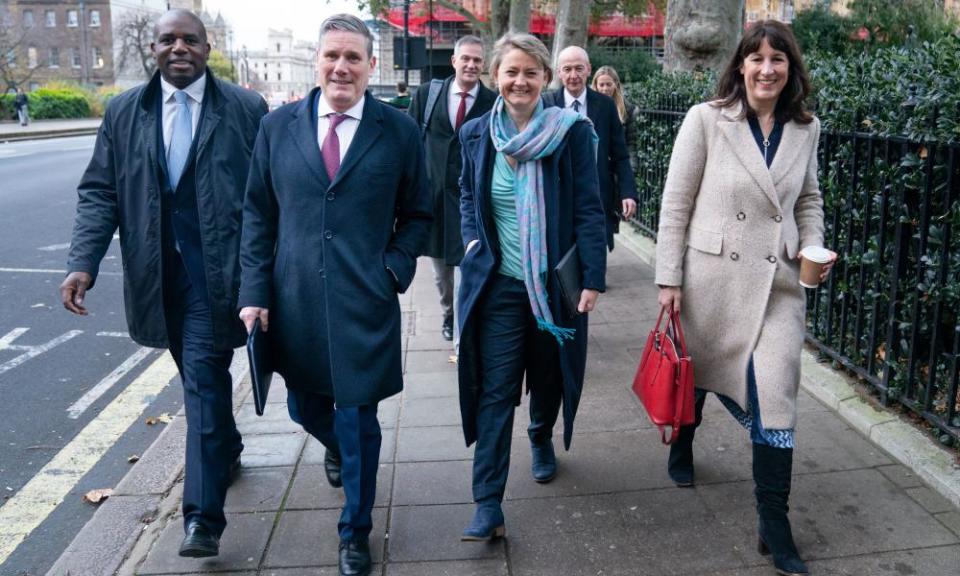The biggest factor behind Keir Starmer’s reshuffle? A general election in 2023

The Labour reshuffle is defined by big names and competent media performers. Now to heal the rift with his deputy
The timing of Keir Starmer’s shadow cabinet shake-up on Monday came as a surprise to many, not least Labour’s deputy leader, Angela Rayner, who felt blindsided by it. But everyone knew the botched reshuffle earlier in the year was a job only half done. When the Labour leader shook up his top team back in May, he did so from a place of weakness, amid the announcement of poor election results. Allies of Rayner were furious when it emerged that Starmer was attempting to sack her, particularly as those results were still rolling in. This week, with improved personal approval ratings and a narrow lead in the polls, Starmer was in a better position to complete the task.
Starmer’s original shadow cabinet saw the most senior roles go to those thought of as quietly competent: Anneliese Dodds as shadow chancellor and Nick Thomas-Symonds as shadow home secretary, for example. Both have been demoted this year. The most vocal people in the parliamentary party, whether Corbynites or Corbyn critics, were initially left out. Fresh faces also dominated at the beginning of the Starmer era. Some MPs privately expressed concerns that there may be a lack of ballsy communicators, save for Rayner, and that there was nobody at the table who could “say the unsayable”. But the new leader’s priority was projecting a calm and sensible image, while forging a path through factional warfare.
Related: Labour reshuffle: who’s up and who’s down in Keir Starmer’s shake-up
Eighteen months into the job, Starmer has changed tack dramatically: he wants assertive media performers and Westminster favourites who have a chance of “cutting through”. This preference favours figures from Labour’s right. Perhaps Starmer is eschewing the “party unity” commitment made in his leadership campaign because he is acting on his real politics at last, or perhaps he simply thinks the best talent happens to be found among Labour’s “moderates”. Whichever is true, the most important factor is that the next general election is fast approaching. With Labour strategists believing it is most likely to take place in May 2023, a more experienced and energetic team was needed.
For Starmer, this meant bringing back someone who has actually served in government: Yvette Cooper. Her promotion to shadow home secretary worries leftwing members who believe that she will take on the Tories by trying to out-Tory them, on immigration especially. For them, her time in the same role during the Ed Miliband years was typified by the infamous “controls on immigration” mugs, which affronted activists while failing to come across as a sincere policy pledge to voters. Critics also point out that her opposite number was Theresa May, home secretary for six years before becoming prime minister. But those close to her counter that Priti Patel has never performed well against her at the home affairs committee, and Cooper has spent five years gathering evidence exploring the how, where and why of Home Office failures.
It is clear that Cooper’s appointment was the centrepiece of the reshuffle. Sources say the reason for the pause in proceedings halfway through the day was that she wanted a conversation about the shape of her role, cross-departmental working and who would lead on what. But the changes were wide-ranging, affecting most shadow cabinet members. They also tightened up the team, making it smaller and ensuring that the roles mostly now mirror existing ones in government (with the notable exception of Miliband’s new climate change and net zero brief). The leadership is pleased that the gender balance is skewed towards women, and the most senior posts are tilted more towards the north of England than north London.
Related: Starmer has put Labour rightwingers back in control – are they up to the task?
Starmer’s choice of top players suggests he has gained confidence. Along with Cooper, Wes Streeting and David Lammy are often tipped as potential future leaders; the same goes for Lisa Nandy although she says she wouldn’t stand again, and Bridget Phillipson is seen as a rising star. Most have been in parliament longer than their leader. While not without risks, this approach gives the positive impression that Starmer is not threatened by colleagues who may be judged to have more star power or more political experience.
Starmer got everyone he wanted in place. The only snub was Cat Smith, who – when offered to stay in post – quit, citing concerns over Jeremy Corbyn’s continued suspension from the parliamentary party. But she had a smaller role that did not shadow a government post anyway. The only real concern from the leadership’s perspective is that tensions remain between itself and Rayner’s team, despite staffing changes in the leader’s office since the last big row around the deputy leader. Starmer cannot remove Rayner from the shadow cabinet due to her personal mandate, so unless he actively wants briefing wars to dominate what could be entirely good news days, he still needs to improve that crucial relationship. But he can take comfort in the reshuffle itself being a clear success.
• Sienna Rogers is editor of LabourList

 Yahoo Finance
Yahoo Finance 